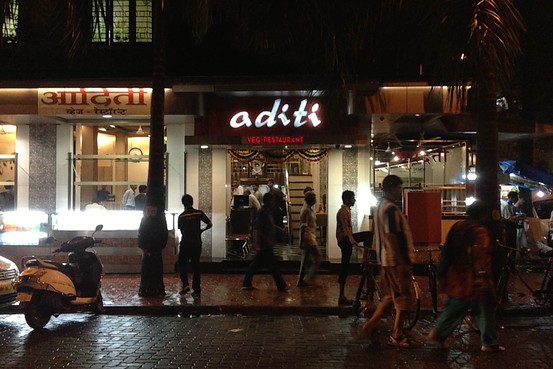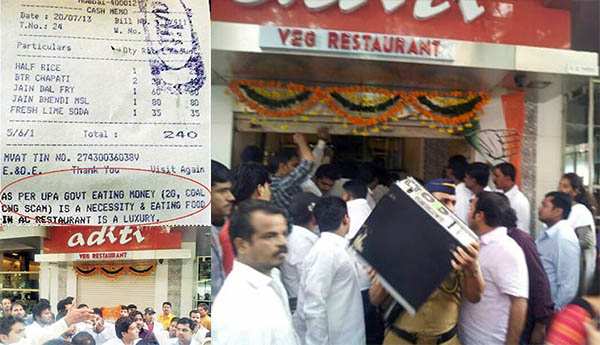MUMBAI: Vijay Kadam does not judge customers who enter the McDonald’s outlet near Mulund station and ask for a masala dosa. He simply tells them that Vishwa Mahal, the Udupi restaurant they were looking for, had shut. The image of nostalgic customers makes Sudhakar Shetty, owner of Vishwa Mahal, smile from behind the cash counter at a nearby hotel. “We had to lease out the space a year ago for personal reasons,” he says.
All over the city, several Udupi restaurants have begun to lease out their properties to fast food chains and banks. The pace at which they have been shutting down has quickened in recent years due to rising costs and manpower shortage. If, as TOI had reported earlier, 150 restaurants shut between 2007 and 2011, in the past two years alone, 90 have folded up, many of them in south Mumbai, says Shashikant Shetty, secretary of AHAR (Association of Hotels and Restaurants).
Chandrasekhar Shetty, who leased out the premises of his two-year-old establishment ‘Flames’ in CBD Belapur to McDonald’s, says, “Four years ago, the restaurant’s gas bill would come to Rs 50,000 a month; today, it is in the region of Rs 4.5 lakh.” Besides, for grade two and grade three Udupi hotels, which boast a lower middle- class clientele, competition from roadside hawkers is another concern.
There is fear that several Udupi hotels are threatening to go down the Irani cafe road. Several are therefore now on the verge of shutting down. “They are all on ventilators in the ICU,” is how hotelier Shrinivas Shetty puts it.
What’s choking these idli-dosa enterpreneurs is not just the hike in various taxes but also red-tapism, says Shrinivas. Getting a registration licence, he explains, involves negotiating at least 45 to 50 municipal departments. “It’s probably easier to get clearance for an AK-47,” says the disenchanted Shrinivas, who owns the famous Aditi Restaurant in Parel, which made headlines in June this year for adding a footnote in the bill that poked fun at the government’s policies. “It was frustration that made me add that footnote,” confesses the hotelier, who had to shut down the AC section of his restaurant after the government included all AC eateries in its purview for paying service tax.
Moreover, the enduring image of the Mangalorean waiter with the trademark towel on his shoulder and pencil behind his ear, is growing scarce. “As literacy is growing, the younger generation finds it beneath them to clean tables and floors,” says Chandrasekhar Shetty.
“It may not be a profitable transaction but it spares me the headache of finding staff,” says the hotelier, adding that even the existing staff from Mangalore is starting to migrate back home since they own houses there and can earn almost as much as they do in Mumbai. Also, since property taxes and other expenses such as electricity and gas have increased, “it is difficult to provide accommodation to staff,” says Chandrasekhar who runs hotel Ramakrishna in Vile Parle.
“Since the common man has to pay 5% service tax and 5% VAT for eating in these restaurants now, he prefers eating on the streets instead,” says hotelier Santosh Shetty. “So these restaurants are leasing out premises to banks and smaller establishments that promise not only a good rent but also overdraft facilities,” adds Santosh who misses the golden period of Udupis in the city, “the time when the mills were alive”.
Between 1960 and 1985, idlis and dosas, he recalls, had begun to beat the city’s gastronomic staple of ‘pav usal and paatal bhaji’. “Though our parents had a nose for business, they did not upgrade their ambience as they lacked confidence,” says Santosh, adding that they were nervous about answering customers in English. But education boosted the second generation to graduate to banquet halls and luxurious setups, says Santosh. However, in the mid?nineties, he found himself renting out his Vile Parle restaurant Shri Gurudev to McDonald’s, which was looking for a street with busy pedestrian traffic.
Inflation has changed prices on the menu card drastically. “Everything from tomatoes to onions is costly and no one’s willing to pay that much,” says a hotelier.
Given the scenario, very soon, Udupi restaurants, whose USP was their service, will have to imitate the self?service models of their competitors. “We will have to use disposable plates,” says Chandrasekar. Already, some hotels, especially those in the Fort area, are experimenting with it.
“Unless government policies change, we will reach a state where hoteliers won’t have food to eat,” says Shrinivas. Perhaps it is to avoid such a fate that a busy Udupi hotel in Thane has now taken off its famous warning: “This place is for eating, not meeting.”



